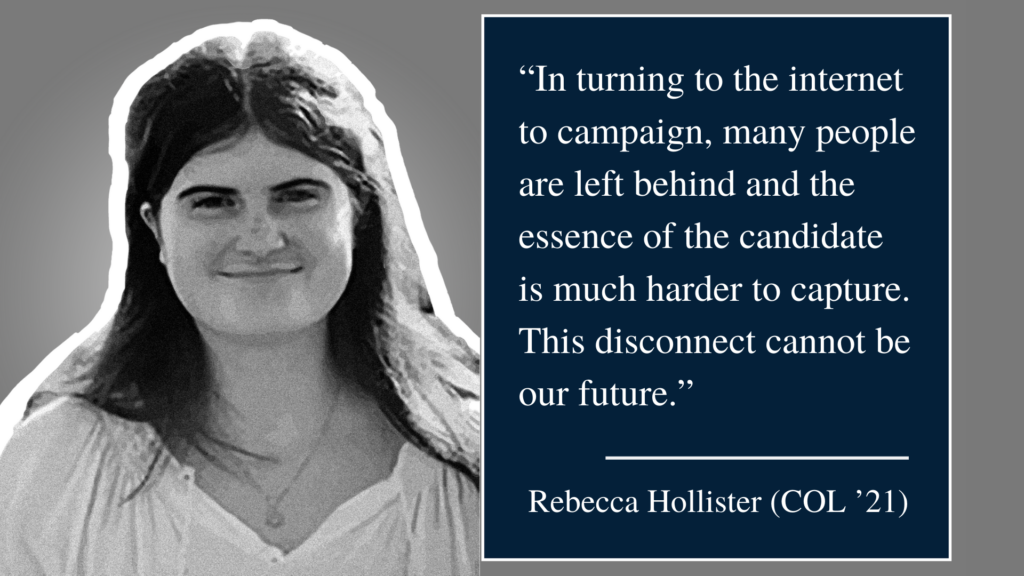Running a campaign is a little like the cooking show “Chopped.” As a campaign manager, I must use ingredients I didn’t get to choose — the candidate, the demographics of the area and available funding and volunteers — and try to make a campaign good enough to win an election. Running a campaign during a global pandemic is like the show “Cutthroat Kitchen,” in which key tools are taken away, new difficulties are added and everything turns to chaos.
Some politically experienced peers assured me that a virtual campaign would not actually be much different than prior campaigns. They argued that, with the technology of today, campaign team members would still be able to reach and engage our voters. I have found throughout the past few months that this stance is not true. In turning to the internet to campaign, many people are left behind and the essence of the candidate is much harder to capture. This disconnect cannot be our future.
I had to think long and hard about how the campaign I am working on was going to be run in this crisis. I even called some of my previous colleagues to ask for advice. Unfortunately, none of them knew what to do either. Our team needed to think of ways to ask people for painfully necessary funds and host events without endangering anyone. To be mindful of the current crisis and still get the job done, campaign staff had to turn to virtual endeavors.
I ran a state house race in 2018, so I know the importance of a launch event for this type of campaign. Usually, the candidate’s friends and family gather in a home or backyard to celebrate the beginning of the campaign and donate to the cause. A party was obviously not possible. As an alternative, one of my candidates was intent on doing a virtual concert to spread good cheer. Her initial vision was a makeshift choir-type event in which a large group of people sing the same song. I told her this was nearly impossible, as everyone had different levels of technology and we could not gather in person. So, we settled for individual performances.
We faced inordinate challenges. It took nearly a week to get everyone together for a brief rehearsal on Zoom. Then we had to figure out ticket sales. It felt odd to charge people to attend a virtual concert, but we needed to make money. We landed on requiring people to reserve a free ticket through our donation page to avoid Zoom-bombers, and so the page prompted them to give money.
When the day of the concert came, I excitedly looked at the ticket sales. We had sold five. I messaged the performers and other people in the campaign asking what was going on. Many people, it turns out, did not understand how to reserve a ticket. After many conversations to clarify the process, the final total was about 35.
All in all, the concert actually went well, despite some hiccups. At first, the performers were talking excitedly on Zoom; thankfully, I realized how to mute everyone. Later, someone tried to share their screen, and my heart leaped into my throat. Additionally, we had someone who reserved a ticket and even donated but could not get onto Zoom. An awkward silence followed each performance as I unmuted the next person, and no one heard applause.
Some people believe that when the COVID-19 pandemic is over, campaigns should continue doing more work virtually from the comfort of our homes. I implore everyone to remember the value of an in-person connection. Many candidates, including some of my own, shine when physically in front of a crowd. The crowd is more energized in person; they can engage with the candidate and share a vulnerable space to ask hard questions. It can be difficult to maintain an authentic connection digitally. At times during our virtual meetings and the concert, it seemed like everyone was just speaking into a void.
When COVID-19 is no longer a threat, campaigns need to make sure to return with higher levels of compassion and in-person connection. If all we can do right now is a virtual concert, that’s fine. However, we must then promise ourselves that when this is over, we will pull back the curtain of a digital screen. My campaigns will personally bring the music to those who haven’t been able to access the true joy it brings for many months.
Rebecca Hollister is a senior in the College. Political Handprints appears online every other Sunday.









